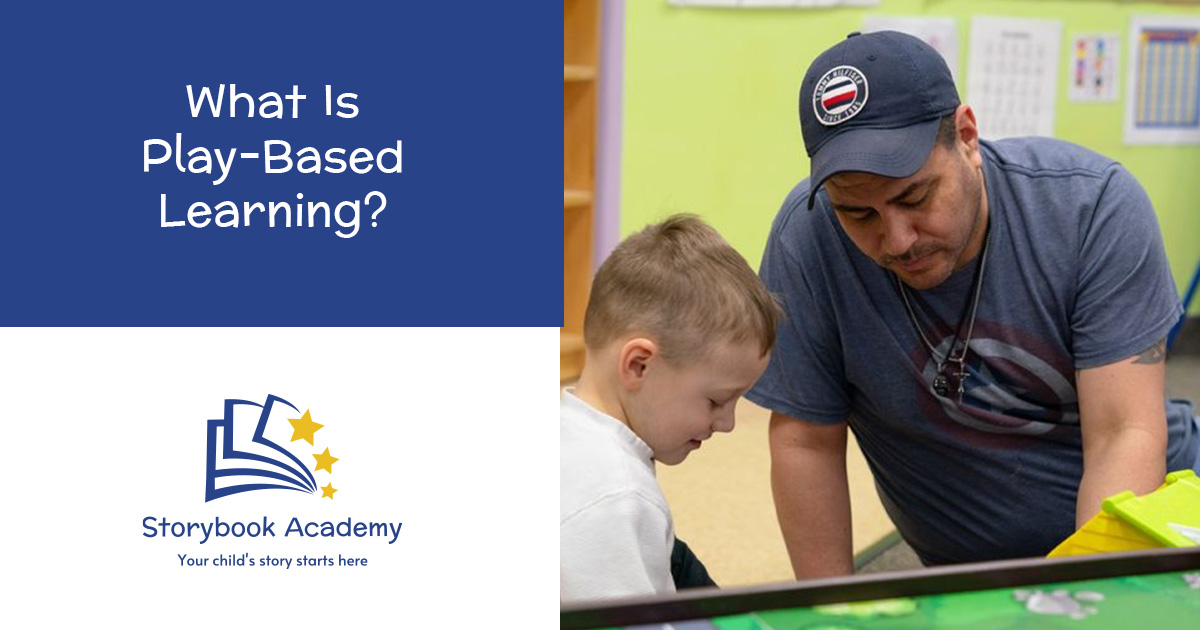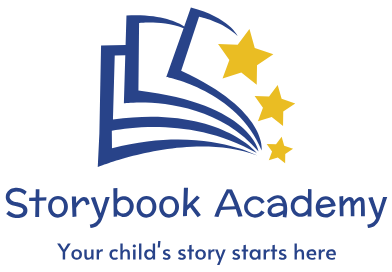What is Play-Based Learning?
Play-based learning is one of the most effective and engaging ways for young children to grow, explore, and understand the world around them. At Storybook Academy, with locations in Amherst and Hamburg, NY, our childcare programs use play as the foundation for early learning. Through play, children build essential skills in communication, problem-solving, and creativity while developing a lifelong love of learning.

Play-Based Learning, Explained
Play-based learning is an educational approach that uses play as the primary method for teaching and discovery. Rather than relying on traditional instruction, children are encouraged to explore materials, interact with their peers, and make their own discoveries.
This method helps children develop cognitive, social, and emotional skills naturally. Whether they are building with blocks, engaging in pretend play, or exploring outdoor environments, each experience helps them learn new concepts and strengthen their understanding of the world.
At Storybook Academy, teachers guide children’s curiosity by asking open-ended questions and creating an environment where every activity offers an opportunity to learn.
5 Key Components of Play-Based Learning
Several elements work together to make play-based learning effective. From the classroom setup to the teacher’s role, each component supports children’s development in a unique way.
1. Environment and Materials
Play-based classrooms are filled with open-ended materials like blocks, books, art supplies, and sensory tools. These materials encourage exploration and creativity. Classrooms are organized to promote independence, allowing children to move freely and make choices that reflect their interests.
2. Child Choice and Voice
Children take the lead in their learning. By choosing activities and deciding how to play, they gain confidence and ownership over their experiences. Teachers observe and support them by asking thoughtful questions that inspire deeper thinking.
3. Adult Interaction and Scaffolding
Educators guide learning through interaction and encouragement. They provide gentle structure and introduce new challenges that extend children’s understanding. This approach helps children develop both academic and emotional resilience.
4. Reflection and Metacognition
Teachers encourage children to think about their play by asking questions like “What did you build?” or “What will you try next?” Reflecting on experiences helps children connect cause and effect, strengthening their problem-solving and reasoning skills.
5. Social, Emotional, and Physical Growth
Every part of play-based learning builds a child’s whole self. Children learn how to cooperate, share, communicate, and manage emotions while developing coordination and fine motor skills through play.
Examples of Play-Based Learning in Action
At Storybook Academy, play-based learning takes many forms—from imaginative storytelling to hands-on science and outdoor exploration. Each activity is thoughtfully designed to help children learn through discovery while having fun.
Dramatic Play: “Restaurant”
Children transform their play kitchen into a restaurant, taking turns as chefs, servers, and customers. Through this activity, they practice counting, language skills, teamwork, and creativity.
Building and Engineering: “Bridge Over Water”
Using blocks and props, children work together to build a bridge across a “river.” They explore balance, measurement, and problem-solving, learning from trial and error.
Sensory Exploration: “Outdoor Discovery”
In the outdoor play area, children mix, pour, and experiment with natural materials like water and sand. This hands-on activity promotes sensory awareness, scientific curiosity, and social interaction.
Benefits of Play-Based Learning
Play-based learning supports the whole child—academically, emotionally, and socially. At Storybook Academy, children benefit from a well-rounded approach that nurtures curiosity and confidence.
- Builds communication and language skills
- Encourages creativity and imagination
- Strengthens problem-solving and critical thinking
- Promotes emotional regulation and self-confidence
- Fosters teamwork and empathy
- Lays the foundation for lifelong learning
How Storybook Academy Helps Children Learn Through Play
At Storybook Academy, play is at the heart of everything we do. Our educators create safe, engaging environments that inspire exploration and discovery. Whether your child is building friendships in our classrooms or exploring nature outdoors, each moment supports growth, confidence, and curiosity.
Discover the Power of Play at Storybook Academy
Play-based learning helps children explore their world, express themselves, and develop skills that last a lifetime. At Storybook Academy in Amherst and Hamburg, we’re proud to offer a warm, engaging environment where children can learn through creativity, movement, and imagination.
If you’re searching for a childcare center in the Buffalo or Western NY area that values joyful, purposeful learning, we invite you to schedule a tour through our online portal or contact Storybook Academy today. Come see how our play-based approach helps children grow with confidence, curiosity, and heart.

Book a Tour at Storybook Academy
The best way to discover what makes Storybook Academy special is to see it firsthand. We provide engaging and interactive tours at our Amherst and Hamburg locations daily. We look forward to meeting you soon and getting to know you and your child more!

